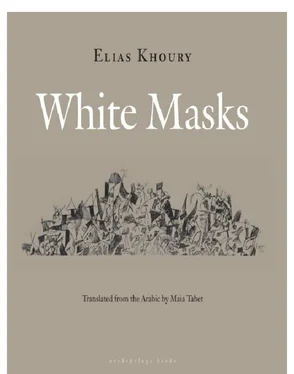The truck comes to a halt beside a mound of garbage. Mohammad al-Kharroubi and Saleh Ahmad jump down and start shoveling the trash into the back of the truck. Zayn remains seated next to the driver — he doesn’t like working this strip of the Manara Corniche: it’s littered with empty beer cans that make him feel nauseous so early in the morning; and anyway, he’s the most senior man among them, he’s been a garbage collector for twenty years, and he’s entitled to a rest. Glancing out the window, he sees al-Kharroubi ogling a young girl wearing blue jogging pants. She’s blonde and fair-skinned, clearly a foreigner. Strange creatures they are, these foreigners. . Fancy getting up at the crack of dawn to jog!
The girl is alone. There’s no one else around. Mohammad al-Kharroubi goes up to her.
“Mmmm. . hot stuff!” Then he wolf-whistles, and intones “ Allah-u-akbar! God is great who bestowed this morning on us!”
The girl steps back as al-Kharroubi draws closer and leans nonchalantly against the front of the truck, baring all his teeth. Then he edges closer and makes an obscene gesture. All of a sudden, seemingly out of nowhere, a young man appears and grabs the girl by the wrist. He glances menacingly at al-Kharroubi, who continues his approach undeterred until the young man releases the girl’s wrist and comes right up to him.
“Looks like we’re in for a bit of trouble,” the driver says, watching the scene impassively and puffing on his cigarette.
Zayn hops out of the vehicle and tries to pull al-Kharroubi back.
“Leave them alone, man.” And looking at the young man, he adds: “Really sorry about this, my apologies, brother.”
The young man turns toward the sea and goes on his way with the girl.
The truck rumbles on. Zayn ’Alloul doesn’t like trouble, he’s sure the young man escorting the foreign girl must be in some position of responsibility or else he wouldn’t dare to be out with her so early in the morning; what’s more, he was armed. If this Mohammad al-Kharroubi had persisted, the man would surely have fired the gun and al-Kharroubi would have died like a dog, without anyone even bothering to ask after him!
He’s got to be someone important, Zayn is sure of that. A neighbor of his in Hamra, a young man about the same age as this one, with a senior position on a newspaper, told him once that the best thing about his job was the foreign women. “They come as reporters to witness the revolution, the toiling masses, and the armed struggle,” he said, “and when we take them to the training camps and the military outposts, they go nuts — they start feeling the guns and firing them. God only knows what gets into them, all they seem to want is to bed the boys… Maybe it’s so they can feel proud that they’ve slept with a revolutionary, or that they can tell everyone back home how they’ve participated in the national struggle, or that they. . this or that.”
“We only just averted trouble there,” says Zayn ’Alloul out loud. Not that he was scared. Not him. Even at the height of the Israeli shelling of Sharqiyyeh, when everyone in the village was running helter-skelter, screaming and shouting for dear life, his heart was like granite. . he absolutely refused to leave the house with the rest of his family that day, despite his wife’s entreaties.
Still, though, Zayn hates trouble: meddle in something that doesn’t concern you, trouble is bound to follow — and you end up with a bruised face. Zayn ’Alloul feels his face gingerly.
Like that day when he got back home — they were still in Naba’a then — and instead of jumping for joy that he was safe, his wife started wailing, “ Ya msibati, ya sh’haari! Oh, that such a fate has befallen me!” He tried to calm her down but she went on and on about his face. He knew how it looked, even though he wouldn’t look in the mirror, he knew his face was swollen and black and blue all over. That was his mistake. He should have kept his big mouth shut. .
Zayn ’Alloul hadn’t done anything. The air battles were raging and people were huddled around their radios listening to the Cairo broadcast. Everyone was incredulous that the Egyptian army had managed to cross the Suez Canal and that the Arabs were now poised to defeat Israel. Zayn and a few other men were standing outside Abu Khalil’s shop, drinking tea and talking, when the conversation shifted to the Bank of America incident. A unit of the Lebanese police had launched an assault on the bank after an armed group had taken some hostages, demanding that the bank contribute to the Arab war effort. As a result of the operation, two gunmen had been killed, two others arrested, and the hostages released.
“It was wrong to do that,” Abu Khalil was saying. “The war is with Israel. Why attack the bank?”
“It’s an American bank, isn’t it? And America is Israel. Whether it’s over there or over here, it’s the same war, can’t you see?” said one of the young men gathered around the shop.
Newspaper in hand, Abu Khalil edged toward the shaft of light pouring out of the shop.
“Listen up, you young ones, Ali Shuayb took an American man hostage — an innocent man — and killed him. That’s not right.” Then he read from the paper: “It was Ali Shuayb who killed the American, John Conrad Maxwell, after explaining to him — with a bit of help from one of the other hostages, as Ali knew no English — that he was going to die because the deadline he’d given the authorities had expired. The American begged for his life to be spared but Ali Shuayb shot him in the back. The American fell to the ground screaming and pleading for his life, while Ali Shuayb and another gunman, thought to be Jihad Assad, kicked him as he lay on the floor. Then Ali aimed at his chest, fired the gun, and the American breathed his last.”
“Tell me now, how can that be right? It’s outrageous,” Abu Khalil added. “We are fighting Israel, aren’t we? So the war’s over there. This isn’t right.”
“Lies, nothing but lies!” Zayn ’Alloul retorted. “Ali Shuayb didn’t shoot the American in the back! He shot him in the chest. We don’t shoot people in the back. It’s nothing but a lie, the government is lying.”
“Ali Shuayb! By God, now there’s a man for you!”
“A man to feel sorry for nonetheless. . He was poor, and it’s always the poor that die!”
And thus it was that Zayn ’Alloul began to recount stories about Ali Shuayb, about guns and weapons, answering this question and that, as if he knew it all. He’d known Ali Shuayb as a child playing in the dirt, and then as a young man, when he and Ali discussed politics. Ali always said that without the armed struggle, there would be no solution. But Zayn hadn’t known that Ali was involved with the feda’iyeen, 4that he was the leader of an armed group, and that he could occupy a bank in the commercial center and kill one of the hostages, and then die like that. Zayn was getting quite carried away.
“I swear to God, tomorrow I’m going down to the village to attend Ali’s funeral. And everyone else should do the same. Ali’s a martyr: a martyr who carried arms, fought, and died for the cause.”
As he answered everyone’s questions, Zayn ’Alloul felt swollen with pride: Ali Shuayb was from his village after all and he knew him very well. Now they would no longer look on him as a mere garbage collector, as someone with a despicable job.
Then the conversation shifted to questions relating to municipal services, and Zayn told them that though work was proceeding normally they needed more trucks, as the city was growing rapidly. He also said that they really should be armed, well he didn’t say that exactly, but he said things that were understood to mean that he was calling for an armed uprising against the government.
Читать дальше












